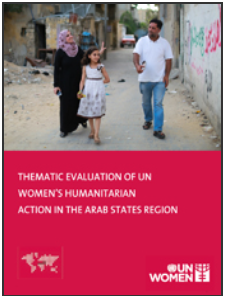Evaluation in the Arab States Region
The 2030 Agenda calls for a follow-up and review mechanism which monitors and evaluates progress for all and is based on processes that integrate gender equality and human rights, focusing on those left furthest behind. Gender-responsive evaluation (GRE) is one key tool to assess progress on delivering on the Sustainable Development Agenda and generate knowledge on what works.
UN Women in the Arab States region works to strengthen the demand and use of gender-responsive evaluation in the region. In promoting GRE, UN Women in the Arab States region focuses on:
- Promoting greater accountability, improved programming and generating knowledge of what works in advancing Gender Equality and the Empowerment of Women (GEEW) through decentralized evaluations
- Supporting national evaluation capacity building for GRE
Promoting greater accountability, improved programming and generating knowledge of what works in advancing GEEW through decentralized evaluations
 Offices in the region commission strategic, thematic, programme and project evaluations to promote accountability and learning to support decision-making and enhance programme effectiveness on gender equality and the empowerment of women. These evaluations span a number of thematic areas including women’s leadership and political participation, women’s economic empowerment, ending violence against women and humanitarian action. All evaluations commissioned by UN Women are public and available on UN Women’s Global Accountability and Tracking of Evaluation Use (GATE) System. To support accountability, management responses to the key evaluation recommendations are also publicly available on the GATE system.
Offices in the region commission strategic, thematic, programme and project evaluations to promote accountability and learning to support decision-making and enhance programme effectiveness on gender equality and the empowerment of women. These evaluations span a number of thematic areas including women’s leadership and political participation, women’s economic empowerment, ending violence against women and humanitarian action. All evaluations commissioned by UN Women are public and available on UN Women’s Global Accountability and Tracking of Evaluation Use (GATE) System. To support accountability, management responses to the key evaluation recommendations are also publicly available on the GATE system.
Supporting national evaluation capacity-building for GRE
UN Women in the Arab States region has been working to support and expand multi-stakeholder partnerships to promote the demand and use of gender-responsive evaluation to assess progress on GEEW in the framework of the Sustainable Development Goals (SDGs). These partnerships have included: (i) civil society, specifically Voluntary Organizations of Professional Evaluators (VOPEs), (ii) government, including, national women’s machineries, and ministries responsible for monitoring and evaluation (M&E) of the SDGs, (iii) members of Parliament, and (iv) UN sister agencies.
This work has focused on the following strategies:
- Regional and country level exchange
In the global framework of enhancing capacity building support to developing countries to increase the availability of high-quality, timely and reliable disaggregated data, UN Women has supported a series of consultations in the Arab States Region enhance the understanding of evaluation, and more specifically gender-responsive evaluation and to exchange ideas on how to move forward on the institutionalization of gender-responsive evaluation in the different countries. These consultations have brought together parliamentarians, ministries responsible for monitoring and evaluating the SDGs, national women’s machineries, and evaluators from across the region, as well as from Latin America, sub-Saharan Africa and South Asia, for dialogue and peer-to-peer learning, and supporting the institutionalization of evaluation at the national level.
- Mapping evaluation policies, systems and capacities at the national level
UN Women is commissioning case studies on national evaluation policies and systems in four countries in the Arab States region, namely, Egypt, Lebanon, Morocco and Tunisia. These case studies document what exists and identify key levers /entry points for establishing a gender-responsive monitoring and evaluation system, providing a foundation for future work on national evaluation capacity.
 Expanding resources and tools on evaluation and the SDGs available in Arabic
Expanding resources and tools on evaluation and the SDGs available in Arabic
To increase accessibility to resources on evaluation and the SDGs, UN Women has been supporting the production and translation of key guidance and tools on gender-responsive evaluation into Arabic. This has included the UN Women Evaluation Handbook on How to Manage Gender Responsive Evaluation and the Evaluating the Sustainable Development Goals with a "No one left behind" lens through equity-focused and gender-responsive evaluations guidance book.